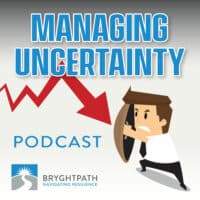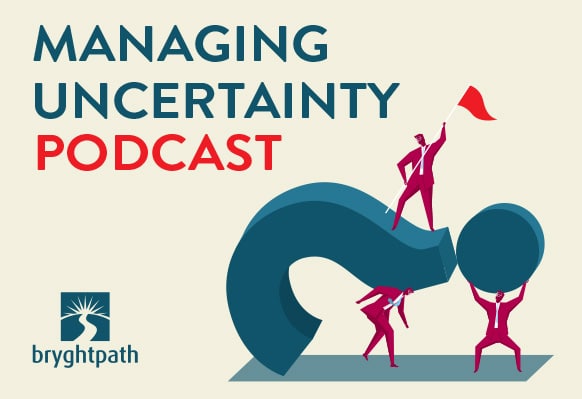
In this episode of the Managing Uncertainty Podcast, Bryghtpath Principal & Chief Executive Bryan Strawser talks about how to choose the right business continuity certification.
Topics discussed include the need for business continuity professional certification, offerings from the Business Continuity Institute (BCI), offerings from the Disaster Recovery Institute International (DRI or DRII), and how to choose which is best for you.
Related Episodes & Blog Posts
- Blog Post: Choosing the Right Business Continuity Certification
- Blog Post: 5 Ways Coaching Can Help Your Business Continuity & Crisis Management Program
- Episode #130: Suiting up for the Crisis – The Crisis Leader
- Episode #133: How to Create and Conduct a Rewarding Crisis Management Exercise
- Episode #139: 2022 Trends in Business Continuity and Crisis Management
- Episode #142: 5 Moments that have shaped my career
Episode Transcript
Hello, and welcome to the Managing Uncertainty Podcast. This is Bryan Strawser, Principal and Chief Executive for Bryghtpath. Welcome to episode 146, where we’re going to talk about how to choose the right business continuity certification.
There are several business continuity certifications out there, and if you’re thinking about a career in business continuity, you might be thinking about BC certification. Do you need one to be competitive for BC jobs? Which one should you get? What does it take to get and maintain a business continuity certification? So I want to give you our take here at Bryghtpath on the top industry certifications and what you need to consider as you decide which business continuity certification is best for you.
Let’s start with the first question. Do you need a business continuity certification to be competitive for business continuity jobs? That answer is maybe. It’s certainly possible to grow your way into a business continuity position from within your organization, but it’s best to start working towards a certification as soon as you can. If you’re looking to start your career in business continuity, most jobs are going to require you to be certified or will expect you to be certified within a certain period of time. That’s especially true if you already have the years of experience required for standard industry certifications. Being eligible, but not having a certification, might stand out as a red flag.
You might also see that automated screening systems used in application processes are going to look for this, and might just decline you outright if you don’t have the certification. If you’ve been lucky enough to climb your way into a BC job within an organization, adding a formal certification to your war chest might be invaluable to getting internal support and resources you need to carry out your program. And while different training and certifications vary, you’ll no doubt benefit from the new tools, resources, and network that come along with some of the training and affiliations with your choice of certified body.
In short, I can’t think of anyone who’s ever regretted getting a business continuity certification. Most wish they had done it sooner. And you can count me as one of those. I didn’t until five years into leading a program at a Fortune 30 organization. That’s when I got my business continuity certification.
So which one should you get? Well, there’s a lot of factors. Prerequisites, costs, training, and ongoing training requirements are all factors in deciding which is right for you. Arguably, the most important thing to choosing the right certification is how it will position you as the expert among your colleagues and industry peers. It’s important to choose the certification that comes from an organization that’s well recognized within your industry and location.
In our field of business continuity, the two main certification bodies are the Disaster Recovery Institute International, DRII, or sometimes used to be known as just DRI, and the Business Continuity Institute. In our experience here in North America, DRII is the most commonly accepted designation here in the United States. Its headquarters is in the US. They’ve been around since the late 1980s. BCI, established in ’94, is in London, in the UK. It’s more widely recognized for locations in Europe, Asia, Africa, and the Middle East, but their presence has been growing across North America in the past decade. We’ll discuss the offerings of each of these here as we go along.
Let’s start with DRII. Their entry-level certification is called the Associate Business Continuity Professional, or ABCP. It’s for those who are just starting their business continuity planning career. There’s no prerequisites. The certification just requires that you pass the qualifying exam, which is $750, and pay an initial application fee of $200. There’s no continuing education requirements. To remain in good standing, you just have to comply with DRI’s code of ethics and pay a $175 annual fee.
The next level, by far the most broadly known business continuity certification, is the Certified Business Continuity Professional, or CBCP. This is for BC professionals who have some experience and are ready to take that certification to the next level. $400 application fee. In addition, applicants must meet some basic requirements. You need two years of experience. You must have passed the same qualifying exam with a minimum grade of 75%. You need to demonstrate your expertise in five specific subject matter areas with written essays for each, and you need to provide some recent references who can confirm your experience. Annual renewal is $200 at the time we recorded this, and it requires 80 continuing education activity points, which is the continuing education system DRII uses. You can earn these points through a variety of activities; training, volunteering, involvement with other professional and industry organizations.
Their highest-tier is the Master Business Continuity Professional, MBCP. This master’s level certification is an advanced level of experience and comprehension. And that application process is rigorous. A master’s level certification is not achieved by that many, and probably not needed for most BC professionals to achieve their programmatic and career objectives. But if you aspire to lead a large program in a large complex organization, the MBCP might be a good fit for you to pursue in the long term.
So that’s DRII. They offer some specialty certifications in some particular industries, along with auditor and some other certifications as well.
Then there’s the Business Continuity Institute, or BCI. Their first certification is the Certificate of the Business Continuity Institute, or CBCI. This is their novice BC certification kind of commensurate to the ABCP from DRI. It requires you to pass a single exam, usually taken after the training course. The exam fee is about $450 US, and the courses start at about $2,500 depending upon location, and whether hybrid, virtual or in person. That certification must be renewed annually. The CBCI also requires 20 hours of continuing professional development. That’s BCI’s term. That must be completed each year prior to applying for renewal. You can earn that through seminars, conferences, and training, and self-directed study opportunities done through BCI.
The next level is the Member of the Business Continuity Institute, or MBCI. They actually have two intermediate certifications. This is one of them. Their fellowship level is their highest. So we have the Associate Member Business Continuity Institute and the Member of the Business Continuity Institute. The MBCI is the most common and widely recognized one from BCI. It’s closely commiserate to the CBCP from DRII.
In 2020, BCI moved to a new certification framework that puts more emphasis on practical experience and demonstrated proficiency, rather than relying on arbitrary time and positions and fixed requirements. Under this new framework, the MBCI just requires that you demonstrate a comprehensive level of competency across several core competency areas. Prior to that, it was much more complicated and confusing, but that’s gone. Applicants must have passed the exam and completed 20 hours of continuing professional development in the last year. Fees vary by region, and membership must be renewed annually. If you have the CBCP or the MBCP from DRI, you can cross certify through primarily just demonstrating competence in your previous experience, which is how I became a member of the Business Continuity Institute.
Lastly, the highest level at BCI is the Fellow of the Business Continuity Institute, or FBCI. Similar to the MBCP from DRII, the fellow is reserved for all but the most accomplished BC professionals. The application process is therefore extensive and rigorous. Prior to 2020, they required a decade of BC experience. That’s now been replaced by a demonstration of advanced competency and ongoing continuing professional development.
So there’s your two organizations and the various certifications that exist that are out there.
Both organizations, BCI and DRII, and some others, also offer specialty certifications that I referenced before. These might be helpful and relevant depending upon your organizational needs. For BC teams that want to ensure mastery of the ISO 22301 process, or conduct your own auditors, there are Implementer and Lead Implementer certifications. There are also Auditor and Lead Auditor certifications. The Lead Auditor certification, for example, really signifies deep experience and understanding of BC practices experience in planning, scheduling, and implementing audit programs. Lead Auditor certification courses are offered by DRI and BCI, and there are similar courses available through ICOR, the International Consortium for Organization Resilience, through BSI, the British Standards Institute, and through the Professional Evaluation and Certification Board, PECB.
I know this episode has had a lot of acronyms for you as we’ve gone along.
That’s a little bit about professional certifications. Again, from our standpoint, this is a good thing to obtain for a BC professional. Both BCI and the DRII certifications are widely accepted around the world. They’re broadly understood. I would encourage you to explore them and consider them as you continue to think about how you can enhance your career as a business continuity professional.
That’s it for this edition of the Managing Uncertainty Podcast. We’ll be back next week with another new episode. Be well.

